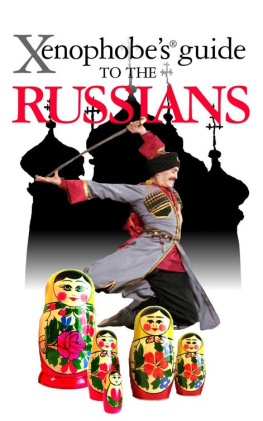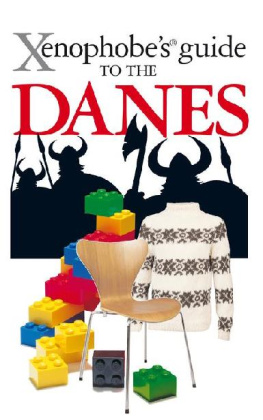Louis James - The Xenophobes Guide to the Austrians
Here you can read online Louis James - The Xenophobes Guide to the Austrians full text of the book (entire story) in english for free. Download pdf and epub, get meaning, cover and reviews about this ebook. City: London, year: 2012, publisher: Xenophobes guides;Oval Projects, genre: Romance novel. Description of the work, (preface) as well as reviews are available. Best literature library LitArk.com created for fans of good reading and offers a wide selection of genres:
Romance novel
Science fiction
Adventure
Detective
Science
History
Home and family
Prose
Art
Politics
Computer
Non-fiction
Religion
Business
Children
Humor
Choose a favorite category and find really read worthwhile books. Enjoy immersion in the world of imagination, feel the emotions of the characters or learn something new for yourself, make an fascinating discovery.
- Book:The Xenophobes Guide to the Austrians
- Author:
- Publisher:Xenophobes guides;Oval Projects
- Genre:
- Year:2012
- City:London
- Rating:5 / 5
- Favourites:Add to favourites
- Your mark:
- 100
- 1
- 2
- 3
- 4
- 5
The Xenophobes Guide to the Austrians: summary, description and annotation
We offer to read an annotation, description, summary or preface (depends on what the author of the book "The Xenophobes Guide to the Austrians" wrote himself). If you haven't found the necessary information about the book — write in the comments, we will try to find it.
The Xenophobes Guide to the Austrians — read online for free the complete book (whole text) full work
Below is the text of the book, divided by pages. System saving the place of the last page read, allows you to conveniently read the book "The Xenophobes Guide to the Austrians" online for free, without having to search again every time where you left off. Put a bookmark, and you can go to the page where you finished reading at any time.
Font size:
Interval:
Bookmark:


The Austrian population is just over 8 million, compared with 10 million Czechs, 5 million Slovaks, 10 million Hungarians, 2 million Slovenes, 58 million Italians, 7.6 million Swiss, 82 million Germans and around 307 million Americans.
A great deal of ink has been spilt in Austria agonizing about Austrian identity. Does it actually exist? Should it exist? Is it expanding or diminishing? Is it drawn from the past only, or will it emerge in the future? Hypochondriacs worry about their ailments; Austrians worry about their identity.
Hypochondriacs worry about their ailments; Austrians worry about their identity.
Austrian identity is suspended somewhere between imperial history and parochial loyalties. In other countries, writes an English historian, dynasties are episodes in the history of the people; in the Habsburg Empire, peoples are a complication in the history of the dynasty. The Republic of Austria only came into being in 1918 after the individual nations of the Habsburgs Austro-Hungarian Empire became independent ; as Clemenceau rather brusquely put it: LAutriche, cest ce qui reste, i.e. Austria consists of what was left over.
A German historian once remarked a trifle ungraciously that Bavarians were the missing link between Austrians and human beings. He obviously forgot that the ancient Austrians actually came from Bavaria, give or take a few Alemanni.
The German view of Austrians has not mellowed with the passing of time. Hordes of Germans certainly come to beautiful Austria for skiing, hiking and sex; even the huge former German Chancellor, Helmut Kohl, used to spend his summer vacation at the Austrian lakes, trying unsuccessfully to lose weight. Unfortunately, this tended to reinforce the image of Austria as a place where you go when you are not being entirely serious, and of the Austrians as a not entirely serious people.
The Germans feel that the Austrians have a tendency to Schlamperei (sloppiness or muddle).
The Germans feel that the Austrians, especially the Viennese, have a tendency to Schlamperei (sloppiness or muddle), which the locals do not seem to view as a failing. (This characteristic was described by a more tolerant Englishman as a sort of laziness, an easy-going spirit which quickly degenerates into slackness. It is shared by the highest and the lowest, causing the former to lose battles, the latter to forget errands.)
The German view of Austrian incompetence is no doubt rooted in history, for the Habsburg armies lost battles to the Prussians with monotonous regularity. The greatest catastrophe was Kniggrtz (Sadowa, 1866), when Austrian soldiers rendered every possible assistance to the oppositions artillery by sporting decorative white uniforms, and the Austrian generals could not comprehend why the enemy consistently refused to adhere to the battle plan which they had patiently worked out in elegant manuvres at home. As one commander plaintively remarked after the defeat: It always worked so well on the Schmelz (then the military parade and exercise ground in Vienna). Germans are mystified by the Austrians delight in telling this story against themselves. To a Prussian, self-irony about military defeats is a self-indulgence only too likely to lead to more of them.
The Austrian generals could not comprehend why the enemy consistently refused to adhere to the battle plan which they had patiently worked out.
Another German observation concerns the legendary (and largely mythical) Austrian meanness, the implication being that at least one nation is even more careful with money than are the Germans themselves. A man from Mnich gives a lift home to a Viennese. The Viennese does not offer to pay for petrol; what is more, he demands that they make an enormous detour to include the suburb of a town where he claims to have business. When they get there, it turns out he has 12 returnable bottles in the boot of the car. An advertisement in a Viennese paper had alerted him to the fact that a shop in this suburb pays 5 cents more for empties than anywhere else in Vienna. Seeing the look on the face of his German friend, he hastily offers to pay for the extra petrol. In the end he pays the equivalent of 36 Euros to save 60 cents.
The Hungarians have learnt to regard their neighbours with some affection, particularly the proprietors of cut-price computer shops and used car lots. Budapestians live in daily expectation, or at least hope, of a wall of money from Austrian investors. Border villagers put up signs, with inscriptions in German, advertising hairdressers , dentists and more arcane wares.
An Austrian marrying into the controlled hysteria of a Hungarian family finds it is just like being at home, only more so.
Whatever the economic situation, Austro-Hungarian liaisons still occur. The substantial areas of common ground between the two usually ensure that they function well. An Austrian marrying into the controlled hysteria of a Hungarian family finds it is just like being at home, only more so, and a Hungarian finds that his Austrian in-laws cook mountains of heavy, calorie-rich food and force him to eat every scrap of it, just like his mother.
Austrians and Hungarians are not divided by a common language, as are Austrians and Germans, or English and Americans. The Hungarian therefore learns German, which for him is the language of money and career advancement, and charms everybody with his picturesque vowels and quaint Magyar idioms. None of his Austrian in-laws is so foolish as to attempt Hungarian which everyone knows is impossible, and he can thus continue to speak uninhibitedly on the family phone to his dodgy business friends in Budapest.
One part of the Austrian psyche is ready to assume that a German scholar carries more weight than an Austrian.
Austrians are deeply ambivalent about the Germans, undecided as to whether they should be portrayed as potential saviours or potential conquerors. It is impossible to ignore entirely the creeping Germanisation of the economy. (Large swathes of the national press and private TV channels are 50% German owned and almost any Austrian author who wants to make it into the big time hastens to find a German publisher.) Sometimes the Germans have to be humoured and honoured because they offer a solution to a problem. For example, university professorships are frequently offered to German scholars, because internal politicking may have blocked all the viable local candidates. Austrian frustration is compounded by the fact that one part of the Austrian psyche is ready to assume that a German scholar carries more weight than an Austrian, while another part of it thinks of the Germans as Piefkes (an abusive term which implies the humourless arrogance of the militaristic Prussian).
The Austrians other neighbours are the Italians, Slavs, Hungarians and Swiss. With the Italians they would have been able to get along all right had the former not stolen South Tyrol in a shabby deal made with the allies during the First World War. This can be overlooked, however, in view of the fact that Italians have traditionally supplied Austria with composers, architects, divas and ice-cream, all of which are popular . They also supply busloads of tourists. The Viennese shop assistants (who learn useful languages) are past masters at gently assisting linguistically challenged Italian ladies to choose the most expensive items on offer.
Font size:
Interval:
Bookmark:
Similar books «The Xenophobes Guide to the Austrians»
Look at similar books to The Xenophobes Guide to the Austrians. We have selected literature similar in name and meaning in the hope of providing readers with more options to find new, interesting, not yet read works.
Discussion, reviews of the book The Xenophobes Guide to the Austrians and just readers' own opinions. Leave your comments, write what you think about the work, its meaning or the main characters. Specify what exactly you liked and what you didn't like, and why you think so.













